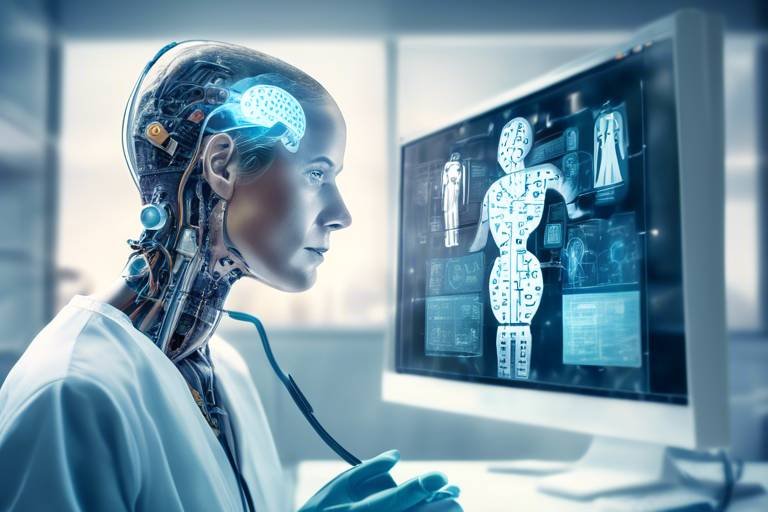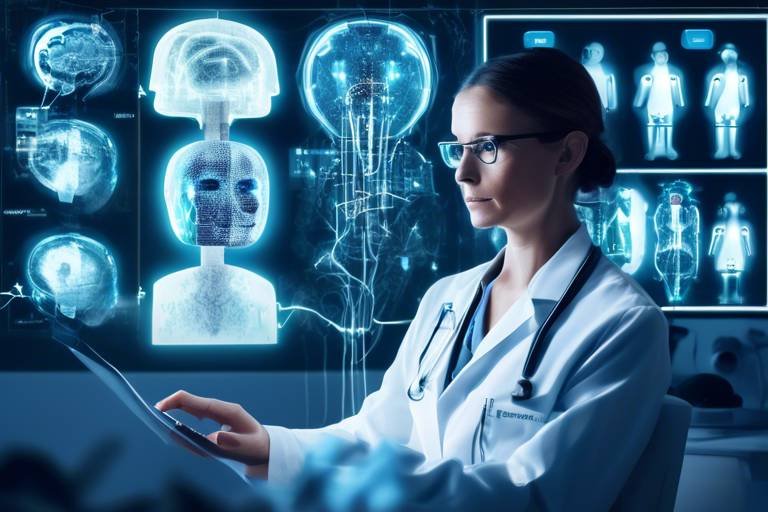Artificial Intelligence: Tackling Future Health Challenges
In today's fast-paced world, the intersection of technology and healthcare is becoming increasingly significant. Artificial Intelligence (AI) stands at the forefront of this transformation, promising to tackle some of the most pressing health challenges we face. Imagine a world where diseases are detected before symptoms even appear, where treatment plans are personalized to fit each individual’s unique genetic makeup, and where patient care is enhanced through the power of AI-driven tools. This isn't just a futuristic dream; it's happening right now!
As we delve into the various ways AI is reshaping the healthcare landscape, we will explore its role in diagnostics, treatment, patient care, and the ethical considerations that accompany these advancements. Each of these areas is crucial in creating a more efficient, effective, and equitable healthcare system. But how exactly is AI making a difference?
First, let’s consider diagnostics. Traditional methods of diagnosis can be time-consuming and sometimes inaccurate. With AI algorithms analyzing medical images and patient data, we are witnessing a revolution in early disease detection. These algorithms can sift through mountains of data in seconds, identifying patterns and anomalies that might be missed by the human eye. This leads to not just faster diagnoses, but also improved patient outcomes. For instance, AI can help radiologists detect early signs of conditions like cancer, significantly increasing the chances of successful treatment.
Next, we dive into treatment. The integration of AI into treatment protocols is changing the game for healthcare providers. Imagine being treated not just as a patient, but as a unique individual with a treatment plan tailored specifically for you. This is the promise of personalized medicine. AI analyzes a plethora of factors—including genetic data and lifestyle choices—to craft bespoke treatment strategies that enhance efficacy. Through genomic analysis, AI can identify genetic markers that inform targeted therapies, ensuring that patients receive the most effective interventions possible.
Moreover, AI's ability to process vast amounts of data offers invaluable insights that inform clinical decisions. This data-driven approach not only optimizes treatment outcomes but also enhances overall healthcare efficiency. The speed and accuracy of AI in drug discovery are equally impressive. By predicting molecular behavior and interactions, AI accelerates the identification of potential drug candidates, making the development of new therapies faster and more reliable.
As we transition to patient care, AI technologies are revolutionizing the way we interact with healthcare systems. With the rise of telemedicine, powered by AI, virtual consultations have become more accessible and efficient. Patients can now receive care from the comfort of their homes, breaking down geographical barriers and making healthcare more inclusive. AI enhances these virtual consultations by providing healthcare providers with real-time data and insights, ensuring that patients receive the best possible care.
Furthermore, AI-driven virtual health assistants are emerging as valuable tools in patient management. These assistants provide personalized information and reminders, significantly improving patient adherence to treatment plans. Imagine having a digital companion that not only reminds you to take your medication but also answers your health-related questions at any time of the day. This level of support can lead to better health outcomes and a more engaged patient population.
However, as we embrace the benefits of AI in healthcare, we must also confront the ethical considerations that arise. Questions about data privacy, algorithmic bias, and the implications of AI decision-making on patient care are paramount. As AI systems handle sensitive patient information, safeguarding this data becomes critical. We must ensure that regulations are in place to protect patient privacy while also fostering innovation.
Additionally, there is a risk that AI algorithms could perpetuate existing biases present in the data they are trained on. This raises concerns about equity in healthcare delivery. To achieve truly equitable healthcare solutions, we must be vigilant in monitoring and addressing these biases in AI systems.
In conclusion, the transformative power of AI in healthcare is undeniable. From diagnostics to treatment and patient care, AI is reshaping the healthcare landscape for the better. However, as we harness this powerful technology, we must also remain committed to addressing the ethical challenges it presents. By doing so, we can ensure that the future of healthcare is not only innovative but also fair and accessible to all.
- What is the role of AI in diagnostics? AI enhances the accuracy and speed of diagnostics by analyzing medical images and patient data, leading to earlier disease detection.
- How does AI contribute to personalized medicine? AI customizes treatment plans based on individual patient data, including genetic information and lifestyle factors.
- What are the ethical concerns surrounding AI in healthcare? Key concerns include data privacy, potential biases in algorithms, and the implications of AI decision-making on patient care.
- How does AI improve patient care? AI enhances patient care through remote monitoring, virtual health assistants, and telemedicine, making healthcare more accessible.

AI in Diagnostics
Artificial intelligence is revolutionizing the field of diagnostics, making it not just faster but also significantly more accurate. Imagine a world where diseases are detected at their earliest stages, allowing for timely intervention and better patient outcomes. This is not just a dream; it's becoming a reality thanks to sophisticated AI algorithms that analyze medical images and vast datasets with a level of precision that surpasses human capabilities.
One of the most compelling aspects of AI in diagnostics is its ability to process and interpret complex medical images. For instance, AI systems can analyze X-rays, MRIs, and CT scans to identify anomalies that may indicate the presence of diseases such as cancer, pneumonia, or fractures. These systems utilize deep learning techniques, which mimic the way the human brain processes information, to learn from thousands of images and improve their accuracy over time. This leads to earlier disease detection, which is crucial in improving survival rates and reducing treatment costs.
Moreover, AI doesn't just stop at image analysis. It can also integrate various data types, including patient history, lab results, and genetic information, to provide a comprehensive diagnostic picture. By synthesizing this information, AI can help healthcare providers make more informed decisions. For example, when a patient presents with a set of symptoms, an AI system can cross-reference these symptoms with a vast database of medical knowledge to suggest possible conditions, thus guiding the physician's further examination.
To illustrate the impact of AI in diagnostics, consider the following table that highlights key advantages of AI-enhanced diagnostic methods:
| Advantage | Description |
|---|---|
| Increased Accuracy | AI algorithms can analyze medical images with greater precision than traditional methods, reducing the likelihood of misdiagnosis. |
| Speed | AI can process data and generate results in a fraction of the time it takes human professionals, leading to quicker diagnosis and treatment. |
| Data Integration | AI systems can combine various data sources to provide a holistic view of a patient's health, improving diagnostic accuracy. |
| Continuous Learning | AI systems improve over time as they are exposed to more data, enhancing their diagnostic capabilities. |
Despite the remarkable advancements, it's essential to note that AI in diagnostics is not meant to replace healthcare professionals. Rather, it serves as a powerful tool that augments their capabilities, allowing them to focus more on patient care. The collaboration between AI and human expertise can lead to a more efficient healthcare system, where doctors can leverage AI's analytical power to enhance their diagnostic accuracy.
As we look to the future, the potential of AI in diagnostics is boundless. With ongoing research and development, we can expect to see even more innovative applications that will continue to push the boundaries of what's possible in healthcare. The integration of AI into diagnostics is not just a trend; it represents a fundamental shift in how we approach health challenges, paving the way for a healthier society.
- What is AI in diagnostics? AI in diagnostics refers to the use of artificial intelligence technologies to analyze medical data, images, and patient information to assist in disease detection and diagnosis.
- How does AI improve diagnostic accuracy? AI improves diagnostic accuracy by processing vast amounts of data, learning from patterns in medical images, and integrating various data sources to provide a comprehensive analysis.
- Can AI completely replace doctors in diagnostics? No, AI is designed to assist healthcare professionals, not replace them. It enhances their capabilities and allows them to make more informed decisions.
- What are the ethical considerations of using AI in diagnostics? Ethical considerations include data privacy, the potential for bias in AI algorithms, and the importance of maintaining trust in the patient-care provider relationship.

AI in Treatment
Artificial Intelligence is not just a buzzword in healthcare; it’s a game-changer that’s reshaping how treatment plans are developed and implemented. Imagine walking into a clinic and receiving a treatment plan that’s not just generic but tailored specifically for you, based on your genetic makeup, lifestyle, and even your preferences. This is the promise of AI in treatment. By leveraging advanced algorithms and vast datasets, healthcare providers can now create personalized medicine strategies that significantly enhance patient outcomes.
One of the most exciting aspects of AI in treatment is its ability to analyze complex data sets to identify the most effective therapeutic strategies. This means that instead of a one-size-fits-all approach, treatments can be customized to fit the unique needs of each patient. For instance, AI can sift through genetic information and medical histories to pinpoint the best course of action, ensuring that patients receive the most suitable therapies. This leads to not just improved efficacy but also a reduction in adverse side effects, as treatments are more aligned with individual biological responses.
When we talk about personalized medicine, we’re diving into a realm where AI plays a pivotal role. By analyzing genetic information, AI can help healthcare providers tailor interventions that are more likely to succeed. Think of it as having a personal health coach that understands your body on a molecular level. This customization isn’t just a luxury; it’s becoming a standard expectation in modern healthcare. Patients no longer have to rely on trial and error; instead, they benefit from data-driven insights that can lead to quicker recovery times and improved quality of life.
Genomic analysis is where the magic happens. AI technologies are capable of interpreting vast amounts of genomic data, identifying genetic markers that can inform targeted therapies. For example, consider a patient diagnosed with cancer. AI can analyze their genetic profile to determine which specific treatments may be most effective based on the cancer's genetic characteristics. This kind of precision medicine is revolutionizing oncology and other fields, allowing for treatments that are not just effective but also personalized.
Furthermore, AI’s ability to process and analyze enormous datasets is a game-changer for clinical decision-making. By utilizing big data analytics, healthcare providers can uncover patterns and insights that would be impossible to identify manually. This means that treatment outcomes can be improved not just for individual patients but across entire populations. For instance, AI can help predict which patients are at higher risk for certain conditions, allowing for proactive interventions that can prevent diseases before they develop.
Beyond personalized treatment plans, AI is also making waves in the field of drug discovery. Traditional drug discovery methods can be lengthy and costly, often taking years to bring a new drug to market. However, with AI, researchers can predict molecular behavior and interactions much faster. Machine learning models can analyze existing data to identify potential drug candidates, significantly shortening the timeline for new treatments. This acceleration in drug discovery means that patients can access innovative therapies sooner, which is especially crucial in fields like oncology where time can be a matter of life and death.
In summary, the integration of AI in treatment is not just enhancing the way healthcare is delivered; it is fundamentally transforming it. By focusing on personalized medicine, genomic analysis, and drug discovery, AI is paving the way for a future where healthcare is more effective, efficient, and tailored to the individual. As we continue to embrace these technologies, the potential for improved patient outcomes and overall health is limitless.
- What is personalized medicine? Personalized medicine is a medical model that tailors treatments to individual characteristics, needs, and preferences of patients, often using genetic information.
- How does AI improve drug discovery? AI accelerates drug discovery by predicting molecular interactions and identifying potential drug candidates more quickly than traditional methods.
- What role does genomic analysis play in AI treatment? Genomic analysis allows AI to interpret genetic data, helping to identify specific markers that can inform targeted therapies for patients.
- Are there any risks associated with AI in healthcare? Yes, there are risks such as data privacy concerns and potential biases in algorithms that need to be addressed to ensure equitable healthcare solutions.

Personalized Medicine
Imagine walking into a doctor's office and receiving a treatment plan that feels as if it was crafted just for you. This is the essence of , and it's rapidly becoming a game-changer in healthcare thanks to the power of artificial intelligence (AI). By analyzing a wealth of data—from genetic information to lifestyle choices—AI is enabling healthcare providers to tailor interventions that significantly enhance treatment efficacy. Rather than taking a one-size-fits-all approach, personalized medicine seeks to understand the unique biological makeup of each patient, allowing for more precise and effective healthcare solutions.
One of the most exciting aspects of personalized medicine is its ability to utilize genetic information. For instance, AI algorithms can sift through complex genomic data to identify specific genetic markers that may influence how a patient responds to certain medications. This not only helps in selecting the right drug but also in determining the optimal dosage. Imagine a scenario where a patient with a specific genetic profile receives a medication that works wonders for them, while others with different profiles might experience side effects or no benefits at all. This level of customization is what makes personalized medicine so revolutionary.
Moreover, AI doesn't just stop at genetics. It also takes into account a patient's lifestyle factors, such as diet, exercise, and even environmental influences. By integrating these diverse data points, AI can provide healthcare professionals with a comprehensive view of a patient's health, leading to informed decisions that optimize therapeutic strategies. For example, a patient with a family history of diabetes may receive dietary recommendations tailored to their genetic predisposition, significantly reducing their risk of developing the condition.
To illustrate the impact of personalized medicine further, consider the following table that highlights the differences between traditional treatment approaches and personalized medicine:
| Aspect | Traditional Treatment | Personalized Medicine |
|---|---|---|
| Approach | Generic treatment plans for all patients | Tailored treatment plans based on individual data |
| Data Utilization | Limited use of patient data | Extensive analysis of genetic, lifestyle, and environmental data |
| Outcome Prediction | Standardized outcomes | Predictive outcomes based on individual response |
| Patient Engagement | Passive involvement | Active participation in treatment decisions |
This table highlights the stark contrast between traditional treatment methods and the innovative approach of personalized medicine. As we continue to harness the capabilities of AI, the future of healthcare looks promising, with the potential for improved patient outcomes and enhanced quality of life.
In conclusion, personalized medicine represents a paradigm shift in how we approach healthcare. With the help of AI, we are moving towards a future where treatments are not only more effective but are also designed with the individual patient in mind. This transformation is not just about technology; it's about putting patients at the center of their healthcare journey and empowering them with choices that align with their unique health profiles.
- What is personalized medicine? Personalized medicine is a medical model that tailors treatment to the individual characteristics of each patient, often using genetic and lifestyle information.
- How does AI contribute to personalized medicine? AI analyzes vast amounts of data, including genetic information and lifestyle factors, to create tailored treatment plans that improve efficacy and outcomes.
- What are the benefits of personalized medicine? Benefits include more effective treatments, reduced side effects, and improved patient engagement and satisfaction.
- Are there any risks associated with personalized medicine? Potential risks include data privacy concerns and the possibility of biased algorithms affecting treatment recommendations.

Genomic Analysis
In the realm of healthcare, stands as a beacon of hope, illuminating the path towards more personalized and effective treatments. Imagine a world where your doctor can tailor a treatment plan specifically for you, based not only on your symptoms but also on your unique genetic makeup. This is not science fiction; it's the reality that artificial intelligence (AI) is helping to create. By leveraging advanced algorithms, AI can sift through mountains of genomic data, identifying patterns and anomalies that hold the key to understanding individual health risks and responses to treatments.
One of the most exciting aspects of genomic analysis is its ability to pinpoint genetic markers that indicate susceptibility to certain diseases. For instance, consider how AI can analyze a patient's genetic profile to determine their risk of developing conditions like breast cancer or diabetes. By recognizing these markers, healthcare providers can implement preventive measures much earlier, potentially saving lives. Here’s how AI makes this possible:
- Data Integration: AI systems can integrate various data sources, including genetic, environmental, and lifestyle factors, to create a comprehensive view of a patient's health.
- Pattern Recognition: Machine learning algorithms excel at recognizing patterns within complex datasets, allowing them to identify subtle genetic variations that might otherwise go unnoticed.
- Predictive Modeling: AI can develop predictive models that forecast how a patient might respond to specific treatments based on their genetic information.
This level of precision in treatment is not just about improving outcomes; it's about reshaping the entire approach to healthcare. The potential to tailor therapies to individual genetic profiles means that patients can receive the most effective treatments with fewer side effects. For example, in oncology, AI-driven genomic analysis can lead to the development of targeted therapies that specifically attack cancer cells while sparing healthy tissue, significantly improving quality of life for patients undergoing treatment.
Moreover, the implications of genomic analysis extend beyond individual treatment plans. By aggregating data from numerous patients, researchers can uncover broader trends and correlations that can inform public health strategies and clinical guidelines. This collective intelligence can lead to breakthroughs in understanding complex diseases and developing new therapeutic approaches.
However, the journey of genomic analysis is not without its challenges. The interpretation of genetic data requires a blend of expertise in genetics, bioinformatics, and clinical medicine. Furthermore, as we delve deeper into the genetic underpinnings of health and disease, ethical considerations regarding data privacy and consent become paramount. Ensuring that patients' genetic information is protected and used responsibly is crucial for maintaining trust in the healthcare system.
In conclusion, genomic analysis powered by AI is revolutionizing the way we approach health and disease. It offers a glimpse into a future where treatments are not just standardized but personalized, paving the way for a more effective and humane healthcare system. As we continue to explore the vast potential of AI in genomics, we must also prioritize ethical considerations to ensure that this powerful technology serves all of humanity.
- What is genomic analysis?
Genomic analysis involves examining an individual's genetic material to identify variations that may influence health, disease susceptibility, and treatment responses. - How does AI enhance genomic analysis?
AI enhances genomic analysis by processing large datasets quickly, identifying patterns, and predicting health outcomes based on genetic information. - Are there ethical concerns with genomic analysis?
Yes, ethical concerns include data privacy, informed consent, and the potential for genetic discrimination.

Data-Driven Insights
In the ever-evolving landscape of healthcare, are becoming the lifeblood of effective treatment strategies. Imagine a world where healthcare providers can make informed decisions based on a treasure trove of patient data—this is not just a dream; it’s a reality powered by artificial intelligence. AI systems are capable of analyzing vast amounts of data, from patient histories to current health trends, and transforming it into actionable insights that can significantly enhance treatment outcomes.
One of the most exciting aspects of AI in healthcare is its ability to recognize patterns within complex datasets. For instance, by examining the health records of thousands of patients, AI can identify risk factors for diseases that may not be apparent to the human eye. This capability allows healthcare providers to intervene earlier, leading to better patient outcomes. Think of it like a detective who uncovers hidden clues in a case—AI sifts through the noise to find the signals that matter most.
Moreover, the integration of big data analytics into clinical decision-making is revolutionizing how healthcare is delivered. With AI, providers can access real-time data that informs their decisions. For example, if a patient presents with certain symptoms, AI can quickly analyze similar cases and suggest possible diagnoses along with recommended treatment plans. This not only streamlines the diagnostic process but also boosts the confidence of healthcare professionals in their decision-making.
To illustrate the impact of data-driven insights, consider the following table that highlights key benefits:
| Benefit | Description |
|---|---|
| Early Detection | AI can analyze historical data to identify early warning signs of diseases, enabling timely interventions. |
| Personalized Treatment | Insights derived from patient data help tailor treatment plans to individual needs, improving efficacy. |
| Resource Optimization | AI helps healthcare facilities allocate resources more effectively, reducing waste and improving service delivery. |
In addition to these benefits, the potential of AI to predict patient outcomes based on historical data is a game changer. By analyzing trends and correlations, AI can forecast how patients are likely to respond to specific treatments, allowing for adjustments before any adverse effects occur. This predictive capability can drastically reduce hospital readmission rates and enhance overall patient satisfaction.
However, while the benefits of data-driven insights are compelling, it’s essential to approach them with caution. The accuracy of AI predictions heavily relies on the quality of the data fed into the systems. Poor data quality can lead to incorrect conclusions, which may adversely affect patient care. Therefore, ongoing efforts to improve data collection methods and ensure data integrity are paramount.
In conclusion, powered by AI are not just enhancing the way healthcare is delivered; they are fundamentally changing the paradigm of patient care. By leveraging these insights, healthcare providers can make informed, timely decisions that lead to better health outcomes and improved patient experiences. As we continue to embrace the digital age, the integration of AI into healthcare promises a future where data is not just collected but utilized effectively to transform lives.
- What are data-driven insights? Data-driven insights are conclusions drawn from analyzing large sets of data, which help inform decision-making in healthcare.
- How does AI improve patient outcomes? AI improves patient outcomes by providing accurate predictions, personalized treatment options, and early disease detection through data analysis.
- What challenges exist with data-driven healthcare? Challenges include data privacy concerns, the need for high-quality data, and the potential for bias in AI algorithms.

Drug Discovery
Artificial Intelligence is not just a buzzword; it's a game-changer in the realm of drug discovery. Imagine a world where the time it takes to develop new medications is drastically reduced, making life-saving treatments available to patients much sooner. This is the reality that AI is helping to create. By utilizing advanced algorithms and machine learning techniques, researchers can predict how different molecules will behave and interact within the body, leading to faster identification of promising drug candidates.
One of the most exciting aspects of AI in drug discovery is its ability to analyze vast datasets. Traditional methods often involve lengthy and costly trial-and-error processes, but AI can sift through millions of chemical compounds in a fraction of the time. This not only expedites the screening process but also enhances the accuracy of predictions regarding which compounds are most likely to succeed in clinical trials.
For instance, AI systems can evaluate both the efficacy and safety profiles of potential drugs by analyzing historical data from previous studies. This capability allows researchers to focus their efforts on the most promising candidates, thereby optimizing resources and reducing waste. Furthermore, AI can assist in identifying potential side effects and contraindications early in the development process, which is crucial for patient safety.
To illustrate the impact of AI on drug discovery, consider the following table that summarizes the traditional drug discovery process compared to the AI-enhanced approach:
| Aspect | Traditional Drug Discovery | AI-Enhanced Drug Discovery |
|---|---|---|
| Timeframe | 10-15 years | 1-3 years |
| Cost | $2.6 billion | $300 million |
| Success Rate | 10% | 30%+ |
As the table shows, the integration of AI can significantly reduce both the time and cost associated with bringing new drugs to market. This means that not only can patients receive treatments faster, but pharmaceutical companies can also allocate their resources more effectively, potentially leading to more innovative solutions in healthcare.
Moreover, AI's ability to learn from new data continuously means that as more information becomes available, the models can be refined and improved. This adaptability is crucial in a field where new discoveries and insights are made every day. By incorporating real-time data and feedback, AI can help researchers stay ahead of the curve, ensuring that drug development is not only efficient but also aligned with the latest scientific advancements.
In summary, the role of AI in drug discovery is nothing short of revolutionary. By streamlining processes, enhancing accuracy, and reducing costs, AI is paving the way for a new era in pharmaceuticals where effective treatments can reach patients more quickly and safely than ever before.
- What is drug discovery? Drug discovery is the process of identifying new candidate medications based on the biological targets.
- How does AI improve drug discovery? AI improves drug discovery by analyzing large datasets to predict drug interactions, efficacy, and safety, significantly speeding up the process.
- What are the benefits of AI in pharmaceuticals? Benefits include reduced development time and costs, increased success rates, and the potential for more personalized medicine.
- Are there any risks associated with AI in drug discovery? Yes, risks include reliance on biased data, which can lead to ineffective or harmful drug candidates. Ensuring data quality and representation is crucial.

AI in Patient Care
Artificial Intelligence (AI) is not just a buzzword; it’s genuinely reshaping how we think about patient care. Imagine a world where your healthcare provider knows you better than you know yourself, not just through a series of appointments, but through constant, real-time data analysis. This is precisely what AI brings to the table—enhanced patient engagement and improved healthcare experiences. By utilizing AI technologies, healthcare providers can monitor patients remotely, ensuring that they receive timely interventions and support without the need for constant hospital visits.
One of the most significant advancements in AI-driven patient care is the rise of telemedicine. This innovative approach allows patients to consult with healthcare professionals from the comfort of their homes. Gone are the days of waiting in crowded waiting rooms; instead, you can connect with your doctor via video calls, which is not only convenient but also efficient. AI enhances these virtual consultations by analyzing patient data in real-time, helping doctors make informed decisions quickly. For instance, during a telemedicine session, AI can provide doctors with insights based on a patient’s medical history, current symptoms, and even data from wearable devices, ensuring that no detail is overlooked.
Moreover, AI-powered virtual health assistants are making waves in the patient care landscape. These digital companions can help patients manage their health by providing personalized information, reminders for medication, and even tips for a healthier lifestyle. Think of them as your personal health coach—always available and ready to assist. For example, a virtual health assistant can remind you to take your medication at the right time or suggest dietary changes based on your health goals. This level of support not only fosters adherence to treatment plans but also empowers patients to take charge of their health.
To illustrate the impact of AI in patient care, consider the following table that highlights key benefits:
| Benefit | Description |
|---|---|
| Enhanced Accessibility | Patients can access healthcare services from anywhere, reducing barriers to care. |
| Real-Time Monitoring | Continuous tracking of health metrics allows for immediate intervention when necessary. |
| Personalized Care | Treatment plans can be tailored to individual needs based on comprehensive data analysis. |
| Improved Engagement | Patients feel more involved in their health decisions, leading to better outcomes. |
In summary, AI is not just a futuristic concept; it is here and now, actively transforming patient care. With advancements in telemedicine and virtual health assistants, patients can expect a more personalized, efficient, and engaging healthcare experience. This shift not only benefits patients but also allows healthcare providers to deliver better care, ultimately leading to improved health outcomes.
- How does AI improve patient care? AI enhances patient care by providing real-time data analysis, facilitating telemedicine, and offering personalized support through virtual health assistants.
- What are the benefits of telemedicine? Telemedicine increases accessibility, reduces waiting times, and allows for immediate consultations without the need for in-person visits.
- Are virtual health assistants secure? Yes, reputable virtual health assistants adhere to strict data privacy regulations to protect patient information.

Telemedicine
In today's fast-paced world, is emerging as a game-changer in healthcare delivery. Imagine being able to consult with your doctor from the comfort of your home, without the hassle of waiting rooms or long commutes. This innovative approach not only enhances accessibility but also significantly improves the efficiency of healthcare services. With the integration of artificial intelligence, telemedicine is evolving into a more personalized and effective solution for patient care.
One of the most remarkable aspects of telemedicine is its ability to bridge the gap between patients and healthcare providers, especially in remote or underserved areas. Patients can receive timely consultations, follow-ups, and even diagnoses without the need for physical visits. This is particularly beneficial for individuals with mobility issues or those living in rural regions where healthcare facilities may be scarce.
AI plays a crucial role in optimizing telemedicine services. For instance, AI algorithms can analyze patient symptoms and medical histories to provide preliminary assessments before a virtual consultation. This means that when you log into your telehealth appointment, your doctor is already equipped with relevant information, making the consultation more focused and efficient. Furthermore, AI can assist in scheduling appointments based on urgency and availability, ensuring that patients receive timely care.
Moreover, telemedicine enhances patient engagement significantly. Patients can easily access their health records, receive reminders for medication, and even track their health metrics through wearable devices. This level of interaction fosters a sense of ownership over one's health, encouraging adherence to treatment plans. For example, a recent study showed that patients who used telemedicine services experienced a 30% increase in adherence to prescribed treatments compared to traditional in-person visits.
However, it's essential to address the challenges that come with telemedicine. Issues such as internet accessibility and digital literacy can hinder its effectiveness. To ensure that everyone benefits from this technological advancement, healthcare providers must prioritize education and resources for patients. Additionally, safeguarding patient privacy during virtual consultations is paramount. As telemedicine becomes more prevalent, healthcare institutions must implement robust security measures to protect sensitive information.
In conclusion, telemedicine, powered by artificial intelligence, is redefining how we approach healthcare. It offers a convenient, efficient, and personalized experience that can significantly improve patient outcomes. As we move forward, embracing this technology while addressing its challenges will be key to creating a more inclusive and effective healthcare system.
- What is telemedicine?
Telemedicine is the remote diagnosis and treatment of patients through telecommunications technology, allowing healthcare providers to consult with patients without in-person visits. - How does AI enhance telemedicine?
AI improves telemedicine by analyzing patient data to provide preliminary assessments, optimizing appointment scheduling, and enhancing patient engagement through personalized health management. - Is telemedicine secure?
While telemedicine offers many benefits, it is essential to ensure that healthcare providers implement robust security measures to protect patient privacy and sensitive information. - Can telemedicine replace traditional healthcare?
Telemedicine is not meant to replace traditional healthcare but rather to complement it. It provides an alternative for consultations and follow-ups, especially for patients in remote areas.

Virtual Health Assistants
In today's fast-paced world, are emerging as game-changers in the healthcare landscape. Imagine having a personal health companion that is available 24/7, ready to answer your questions, remind you of your medications, and even guide you through your treatment plan. These AI-driven assistants are not just a futuristic concept; they are here, and they are revolutionizing how we interact with healthcare.
One of the most significant advantages of virtual health assistants is their ability to provide personalized support. They use sophisticated algorithms to analyze individual patient data, which allows them to tailor their responses and recommendations. For instance, if a patient is managing a chronic condition like diabetes, the virtual assistant can offer customized advice on diet, exercise, and medication management based on the patient’s unique health profile. This level of personalization enhances patient engagement and can lead to better health outcomes.
Moreover, these assistants can improve patient adherence to treatment plans. Studies have shown that patients often forget to take their medications or follow through with their healthcare routines. Virtual health assistants can send timely reminders and motivational messages to encourage compliance. Imagine receiving a gentle nudge from your virtual assistant saying, "Hey, it's time to take your medication!" or "Don't forget to log your blood sugar levels today!" This simple yet effective communication can make a world of difference in managing health conditions.
Another exciting aspect of virtual health assistants is their ability to facilitate remote monitoring. With the rise of wearable technologies, these assistants can track vital signs and health metrics in real time. For example, if a patient’s heart rate spikes beyond a certain threshold, the virtual assistant can alert both the patient and their healthcare provider, ensuring timely intervention. This proactive approach to health management not only enhances patient safety but also fosters a sense of empowerment among patients, allowing them to take charge of their health.
However, it's essential to recognize that the integration of virtual health assistants into healthcare systems also comes with challenges. Issues such as data privacy and the accuracy of information provided by these assistants are paramount. Patients must feel confident that their personal health information is secure and that the advice they receive is based on sound medical knowledge. As we continue to embrace this technology, ongoing discussions about regulations and ethical standards will be crucial to ensure that virtual health assistants serve as trusted allies in patient care.
In summary, virtual health assistants represent a significant leap forward in healthcare delivery. They provide personalized, timely support that can enhance patient adherence, improve health outcomes, and empower individuals to take control of their health. As technology continues to advance, we can expect these digital companions to become even more sophisticated, making healthcare more accessible and efficient for everyone.
- What are virtual health assistants?
Virtual health assistants are AI-driven tools that provide personalized health information, reminders, and support to patients, enhancing their healthcare experience. - How do virtual health assistants improve patient adherence?
They send reminders and motivational messages to encourage patients to follow their treatment plans and manage their health effectively. - Are virtual health assistants secure?
While they offer many benefits, data privacy is a critical concern, and it is essential to use trusted platforms that comply with regulations. - Can virtual health assistants monitor my health in real-time?
Yes, they can track vital signs through wearable technologies and alert healthcare providers if there are any concerning changes.

Ethical Considerations
The integration of artificial intelligence in healthcare has undoubtedly brought about remarkable advancements, but it also raises a plethora of that cannot be overlooked. As we dive deeper into the realm of AI, we must confront the challenges related to data privacy, algorithmic bias, and the implications of AI decision-making on patient care and trust. These ethical dilemmas are not just theoretical; they have real-world consequences that can affect the quality of care patients receive.
One of the most pressing issues is data privacy. AI systems often require access to vast amounts of sensitive patient information to function effectively. This raises the question: how do we ensure that this data is safeguarded? In an era where data breaches are becoming alarmingly common, healthcare providers must prioritize the protection of patient information. Regulations such as the Health Insurance Portability and Accountability Act (HIPAA) in the United States are designed to protect patient privacy, but as AI technologies evolve, so too must our approaches to data security. It’s essential for healthcare organizations to implement robust cybersecurity measures and to ensure that their AI systems comply with existing regulations.
Another significant concern is the potential for bias in algorithms. AI systems learn from the data they are trained on, which means that if this data contains biases—whether related to race, gender, or socioeconomic status—the AI can inadvertently perpetuate these biases in its decision-making processes. This can lead to inequitable healthcare outcomes and exacerbate existing disparities in care. For example, if an AI system is trained predominantly on data from one demographic group, it may not perform as effectively for others. This highlights the need for diverse and representative datasets in AI training, as well as ongoing monitoring to identify and rectify any biases that may arise.
Moreover, the implications of AI decision-making on patient care and trust cannot be understated. When AI systems are involved in diagnosing or recommending treatments, patients may question the reliability of these recommendations. Are they getting the best care possible, or are they simply a number in a data set? This skepticism can undermine the patient-provider relationship, which is foundational to effective healthcare. To build trust, healthcare providers must be transparent about how AI technologies are used in patient care and involve patients in the decision-making process.
In summary, while AI has the potential to revolutionize healthcare, we must navigate the ethical landscape with caution. It is imperative to establish frameworks that prioritize data privacy, address algorithmic bias, and maintain patient trust. By doing so, we can ensure that the benefits of AI are realized without compromising the ethical standards that underpin healthcare delivery.
- What are the main ethical concerns regarding AI in healthcare?
The primary concerns include data privacy, algorithmic bias, and the impact of AI decision-making on patient trust. - How can we ensure patient data privacy in AI systems?
Implementing robust cybersecurity measures and adhering to regulations like HIPAA are essential steps in safeguarding patient information. - What is algorithmic bias, and why is it a problem?
Algorithmic bias occurs when AI systems produce unfair outcomes due to biased training data, leading to inequitable healthcare access and treatment. - How can healthcare providers build trust with patients regarding AI?
Transparency about AI use and involving patients in the decision-making process can help build trust in AI technologies.

Data Privacy
In today's digital age, where information flows faster than a river in spring, has emerged as a paramount concern, especially in the realm of healthcare. With artificial intelligence systems processing vast amounts of sensitive patient information, the stakes have never been higher. Imagine a world where your most private health details are mishandled or exposed—it's a nightmare scenario that many fear could become a reality if stringent measures are not put in place.
AI technologies, while revolutionary, must navigate a complex landscape of regulations and ethical standards to safeguard patient data. The Health Insurance Portability and Accountability Act (HIPAA) in the United States sets strict guidelines on how healthcare data should be handled, but compliance is only part of the solution. Healthcare providers must also invest in advanced security protocols to protect against data breaches and unauthorized access. This includes using encryption methods, conducting regular audits, and ensuring that all personnel are trained in data protection practices.
Moreover, the responsibility doesn't solely lie with healthcare providers. Patients themselves play a crucial role in maintaining their data privacy. Here are some key practices that patients should consider:
- Be Informed: Understand what data is being collected and how it will be used.
- Consent Matters: Always read consent forms carefully before agreeing to share personal health information.
- Secure Your Devices: Use strong passwords and keep software updated to protect personal health apps.
As AI systems evolve, so too must our understanding of data privacy. It's essential to strike a balance between leveraging AI for improved healthcare outcomes and ensuring that patient information remains confidential. The development of anonymization techniques—where personal identifiers are removed from data sets—can help mitigate risks while still allowing researchers and healthcare providers to gain valuable insights from data analytics.
In conclusion, while AI holds incredible potential for transforming healthcare, it also brings significant challenges regarding data privacy. By fostering a culture of transparency and accountability, we can harness the power of AI without compromising the trust that is so vital in the patient-provider relationship. As we move forward, the conversation about data privacy must remain at the forefront of discussions surrounding AI in healthcare, ensuring that patient rights are always prioritized.

Bias in Algorithms
As we delve deeper into the realm of artificial intelligence in healthcare, one of the most pressing concerns that arises is the issue of . This isn't just a technical hiccup; it has real-world implications that can affect patient care and outcomes. Imagine a scenario where an AI system, designed to assist doctors in diagnosing diseases, is trained on a dataset that predominantly features one demographic group. The result? The AI may fail to accurately recognize symptoms in patients from other backgrounds, leading to misdiagnoses and inadequate treatment. This highlights a critical point: the data we feed into AI systems directly influences their effectiveness and fairness.
Bias can creep into algorithms in various ways, including:
- Data Selection: If the data used to train AI models is not representative of the entire population, the AI's performance can be skewed.
- Labeling Bias: Errors in how data is labeled can lead to incorrect conclusions drawn by AI systems.
- Feedback Loops: If biased AI systems are used in practice, they can reinforce existing disparities, creating a cycle that is hard to break.
To illustrate this point, consider a study that analyzed AI algorithms used in dermatology. Researchers found that these algorithms were less accurate in diagnosing skin conditions in individuals with darker skin tones compared to those with lighter skin tones. This disparity not only raises ethical questions but also emphasizes the need for equitable healthcare solutions that are inclusive of all demographics.
Moreover, the implications of biased algorithms extend beyond individual patient care. They can affect healthcare policies, resource allocation, and the overall trust in AI systems. If patients feel that AI tools are biased, they may be less likely to engage with these technologies, which could lead to poorer health outcomes. Therefore, addressing bias in algorithms is not just a technical challenge; it's a matter of ensuring that all patients receive the best possible care.
In response to these challenges, healthcare organizations and AI developers must prioritize diversity in their datasets and actively work to identify and mitigate biases during the development process. This includes rigorous testing of AI systems across different demographic groups and implementing transparent practices that allow for ongoing evaluation and adjustment of algorithms as needed.
Ultimately, the goal should be to create AI systems that not only enhance healthcare delivery but also promote equity and trust among patients. By recognizing and addressing the biases that exist within AI algorithms, we can pave the way for a more inclusive and effective healthcare landscape.
- What is bias in AI algorithms?
Bias in AI algorithms refers to the systematic favoritism or prejudice that can occur when an AI system is trained on unrepresentative or flawed data, leading to unfair outcomes. - How does bias in algorithms affect patient care?
Bias can lead to misdiagnoses or inadequate treatment for certain demographic groups, ultimately compromising the quality of care provided. - What steps can be taken to reduce bias in AI?
Healthcare organizations can ensure diverse datasets, conduct thorough testing across various demographics, and implement transparent practices for ongoing evaluation.
Frequently Asked Questions
- What is the role of AI in diagnostics?
AI is revolutionizing diagnostics by enhancing both accuracy and speed. Through advanced algorithms, AI analyzes medical images and data, leading to earlier disease detection and improved patient outcomes. Imagine having a virtual assistant that never tires, constantly learning and adapting to provide the most precise insights!
- How does AI contribute to personalized medicine?
AI plays a crucial role in personalizing treatment plans by analyzing individual patient data, including genetic information and lifestyle factors. This customization helps healthcare providers tailor interventions for better efficacy, making treatment as unique as the individual receiving it.
- What advancements are being made in drug discovery through AI?
AI is significantly speeding up the drug discovery process. By predicting molecular behavior and interactions, machine learning models streamline the identification of potential drug candidates. This means that new medications can be developed faster, potentially saving lives.
- How is AI improving patient care?
AI enhances patient care through technologies like remote monitoring and virtual health assistants. These tools improve patient engagement and adherence, making healthcare experiences more efficient and accessible. Think of it as having a personal health coach available 24/7!
- What are the ethical concerns surrounding AI in healthcare?
The use of AI in healthcare raises significant ethical questions, particularly regarding data privacy and algorithmic bias. It's crucial to ensure that patient data is safeguarded and that AI systems are designed to be equitable, promoting trust in healthcare solutions.
- How can we ensure data privacy with AI systems?
Ensuring data privacy involves implementing robust security measures and adhering to regulations that protect sensitive patient information. Organizations must prioritize safeguarding data to maintain patient trust and comply with legal standards.
- What are the implications of bias in AI algorithms?
Bias in AI algorithms can lead to unequal healthcare solutions, perpetuating existing disparities. It's essential to recognize and address these biases to create equitable systems that serve all patients fairly, ensuring everyone receives the care they deserve.



















